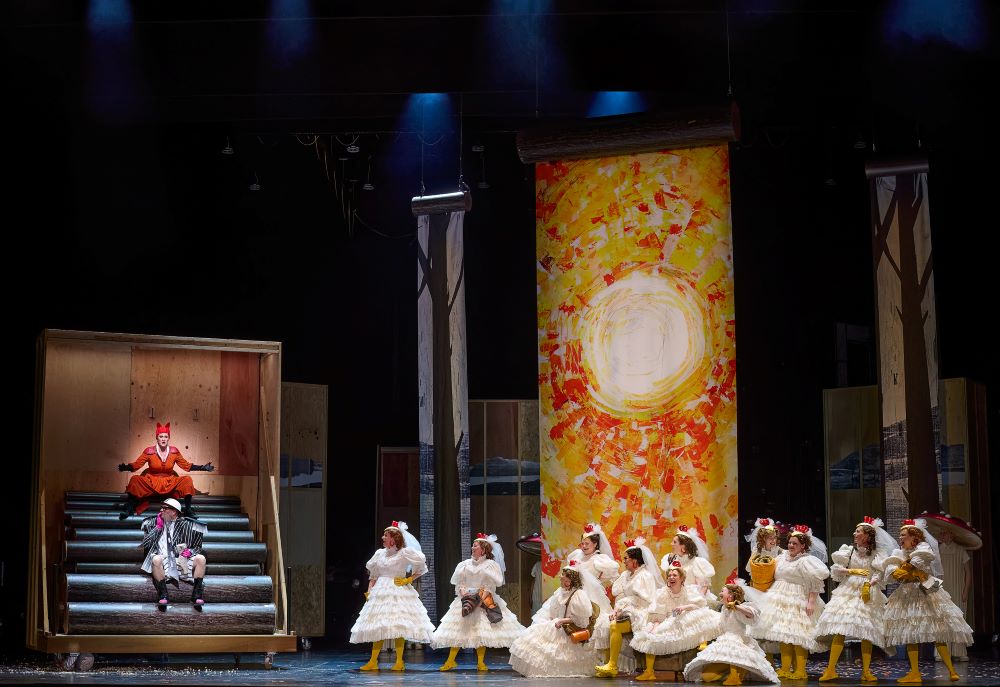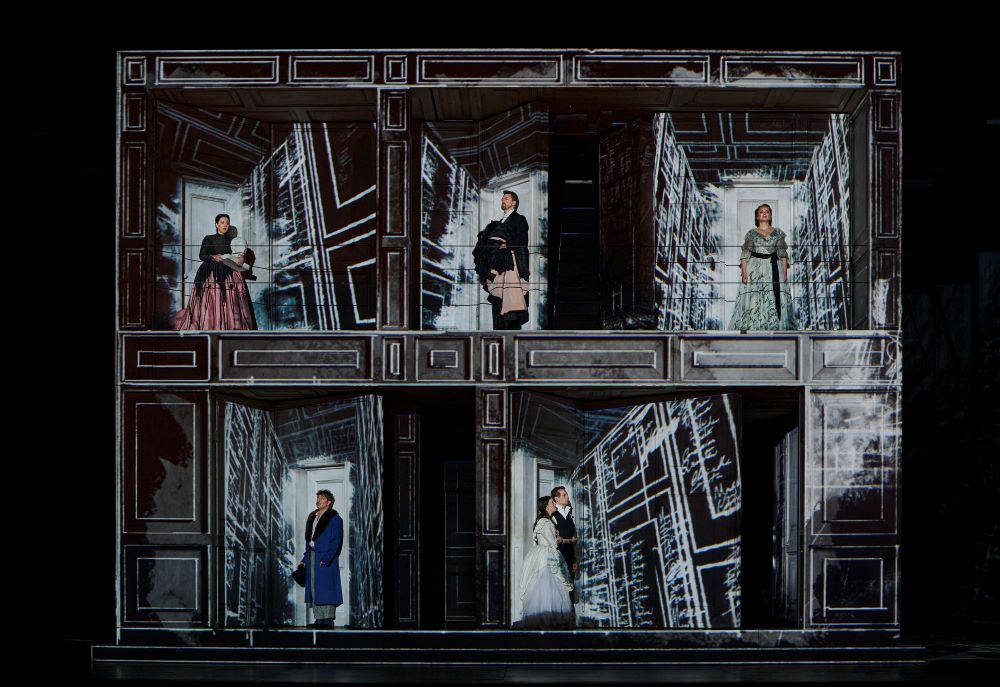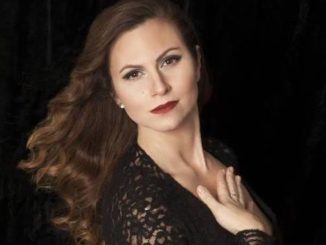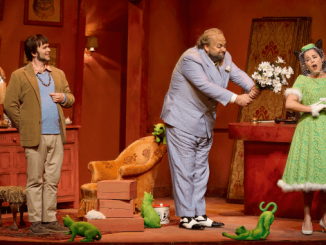The Canadian Opera Company’s February offerings could not be more different. Leoš Janáček’s Cunning Little Vixen is a proto-modernist rumination on love and death, tracking the lifetime of the title character – a female fox – who is trapped by a Forester as a cub, raised by him (and his sadistic wife/children), before finally escaping his clutches to wander through a series of misadventures featuring other anthropomorphic members of the animal kingdom.
Though nominally about one older man’s obsession with a young female fox, Vixen is primarily an excuse for a series of moralizing anecdotes about male hypocrisy. Much of the opera simply consists of various men – the parson, the schoolmaster, etc. – sitting around and knocking back pints of ale, going endlessly on about the women they’re chasing after, including the unseen but much discussed local beauty, Terynka.
Interspersed with these scenes are the vixen’s journey across the forest, where she encounters crickets, frogs, grasshoppers, and, inevitably, another (male) fox. Saving the fox, most of the animals are played (delightfully) by child singers.

The COC production, directed by Jamie Manton of English National Opera fame, matches a beautiful Expressionistic set to Janáček’s Expressionistic, beautiful (if occasionally challenging) score. Unfortunately, this production is also plagued by decidedly un-beautiful creature design, the poor singers saddled with cheap-looking costumes that look like rejects from Cirque du Soleil. (The dog, in particular, is so absurd that it elicits inappropriate laughter from the audience.) Not that Vixen was ever a “traditional” opera, but it would have been nice if the animals looked more like the comic fairy tale which inspired this opera.
The saving grace of this Vixen is, as always, the vocal performances. Canadian soprano Jane Archibald is simply stellar in the title role, balancing the vixen’s wide-eyed naïveté (she knows little of the outside world beyond the four walls of the Forester’s house) with a mischievous spirit which has her, among other things, playing the literal fox in the henhouse during an early, highly entertaining sequence of rebellion against the local rooster.
Christopher Purves is formidable as the Forester, a clearly pained man who has taken in a helpless animal, mistreated it for years, and then is surprised when it betrays him. Special kudos too to the young singers in key roles: Emma Moreau (Young Vixen), Joel Glickman Rosen (Frog), Sofia Melnyk-Gomez (Grasshopper), and Lee Macerollo-Korzeniowski (Cricket) are all highly entertaining with great voices.

Paired with Vixen this February is another opera about hypocritical men, Mozart’s darkly comedic Don Giovanni.
The last time I saw this particular production, by Kasper Holten, was at its 2014 premiere at London’s Royal Opera House. There, as here, I was impressed by the combination of dizzying set design (aided by some well-designed video projections) and more traditional costume choices, which nevertheless serve to accentuate the dark tinge to everything Don Giovanni – the original Don Juan – gets up to.
So, on the one hand, you have some of the most exquisitely beautiful music Mozart ever wrote, such as the lovers’ duet Là ci darem la mano; while, on the other hand, we cannot ignore that this duet is sung by the ruthless seducer Giovanni alongside the naive Zerlina (who is betrothed, of course, to another).
Canadian Gordon Bintner appears as Don Giovanni, with Paolo Bordogna taking on the Don’s comic relief sidekick Leporello (who, in this production, is a bit more subdued than Leporellos past). The real draw is superstar Romanian soprano Anita Hartig as Donna Elvira, the Don’s jilted lover. Hartig, who has recently taken on the title roles in Met Opera productions of La bohème and La Traviata, has a strong stage presence and lovely, lyrical voicework, both of which suit this formidable character, set on enacting vengeance on behalf of herself and all those (men and women) betrayed by the Don.
The oddest choice in this Holten production is the jettisoning of the finale, cutting Mozart’s celebratory final chorus – where each character gets a chance to sing about their future plans – in order to keep the attention squarely focussed on Don Giovanni.
While that final scene has often been awkward to stage – at one point, one of the sopranos announces she’s “off to the convent!” like it’s a point to celebrate – it’s unfortunate that the glorious Mozart chorus, Questo è il fin di chi fa mal, e de’ perfidi la morte alla vita è sempre ugual, is a casualty of that edit.
Nevertheless, it’s still a striking production of one of Mozart’s greatest works, by one of Europe’s greatest living opera directors.
***
For more on and tickets to the COC’s 2024 season, click here.



